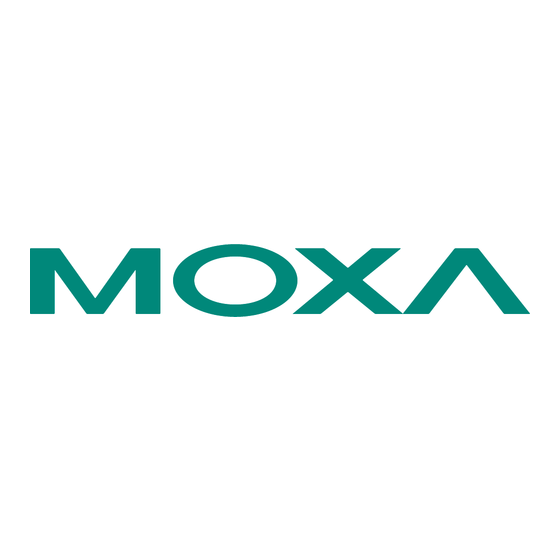Summary of Contents for Moxa Technologies UC-7101
- Page 1 UC-7101 Hardware Manual Fifth Edition, July 2014 www.moxa.com/product © 2014 Moxa Inc. All rights reserved.
-
Page 2: Copyright Notice
UC-7101 Hardware Manual The software described in this manual is furnished under a license agreement and may be used only in accordance with the terms of that agreement. Copyright Notice © 2014 Moxa Inc. All rights reserved. Trademarks The MOXA logo is a registered trademark of Moxa Inc. -
Page 3: Table Of Contents
Hardware Connection Description ..................... 3-1 Wiring Requirements ........................... 3-2 Connecting the Power ........................3-2 Grounding the UC-7101 Embedded Computer ................. 3-3 Connecting Data Transmission Cables ....................3-3 Connecting to the Network ......................3-3 Connecting to a Serial Device ....................... 3-4 Serial Console Port ........................ -
Page 4: Introduction
Ethernet ports, RS-232/422/485 serial ports, and an ARM9 processor. The computers come with Linux pre-installed. In addition, the UC-7101 has an internal SD socket for storage expansion to offer high performance communication with unlimited storage in a super-compact, palm-size box. The UC-7101 series of embedded computers are the right solution for embedded applications that call for a small computer that can store large amounts of information and provide good computing performance. -
Page 5: Overview
RS-232/422/485 serial ports and 10/100 Mbps Ethernet LAN ports to provide users with a versatile communication platform. The UC-7101 series computers use the Moxa ART ARM9 192 MHz RISC CPU. Unlike the x86 CPU, which uses a CISC design, the ARM9’s RISC design architecture and modern semiconductor technology provide these computers with a powerful computing engine and communication functions, but without generating too much heat. -
Page 6: Product Features
UC-7101 Hardware Introduction Product Features UC-7101 series computers have the following features: • Moxa ART ARM9 32-bit 192 MHz processor • 16 MB RAM (about 12 MB of user programmable space) • 8 MB Flash ROM (about 4 MB of user programmable space) •... - Page 7 UC-7101 Hardware Introduction Physical Characteristics Housing: Aluminum (1 mm) Weight: 130 g Dimensions: 67 x 22 x 100.4 mm (2.64 x 0.87 x 3.95 in) Mounting: DIN rail, wall Environmental Limits Operating Temperature: Standard Models: -10 to 60°C (14 to 140°F) Wide Temp.
-
Page 8: Hardware Block Diagrams
UC-7101 Hardware Introduction Hardware Block Diagrams... -
Page 9: Hardware Introduction
The hardware platform is reliable and stable, and provides a strong foundation from which to build custom solutions. In this chapter, we cover basic aspects of the UC-7101’s hardware. The following topics are covered in this chapter: ... -
Page 10: Appearance
UC-7101 Hardware Hardware Introduction Appearance Dimensions... -
Page 11: Panel Views
UC-7101 Hardware Hardware Introduction Panel Views LED Indicators The following table shows the functions of the five LED indicators located on the front panel of the UC-7101 embedded computers. LED Name LED Color LED Function Ready Green Power is on and functioning normally. -
Page 12: Internal Sd Socket
SD slot. The internal SD slot is located on the top side of the UC-7101’s main board, in the slot on the right side of the UC-7101. Plug the SD card into the socket directly. -
Page 13: Hardware Connection Description
Hardware Connection Description In this chapter, we show how to connect the UC-7101 embedded computer to the network and to various devices. The following topics are covered in this chapter: Wiring Requirements Connecting the Power Grounding the UC-7101 Embedded Computer ... -
Page 14: Wiring Requirements
Connecting the Power Connect the “live-wire” end of the 12-48 VDC power adapter to the UC-7101 terminal block. If the power is supplied properly, the “Ready” LED will glow a solid green color after a 25 to 30 second delay. -
Page 15: Grounding The Uc-7101 Embedded Computer
Connecting to the Network Connect one end of the Ethernet cable to the UC-7101’s 10/100M Ethernet port, and the other end of the cable to the Ethernet network. If the cable is properly connected, the UC-7101 will indicate a valid connection to the Ethernet in the following ways: •... -
Page 16: Connecting To A Serial Device
Hardware Connection Description Connecting to a Serial Device Connect the serial cable between the UC-7101 and the serial device(s). The two serial ports (P1 and P2) use male DB9 connectors that can be configured for RS-232/422/485 by software. The pin assignments are shown in the following table:... -
Page 17: Installing A Secure Digital (Sd) Memory Card
Installing a Secure Digital (SD) Memory Card The SD slot is located on the right side of the UC-7101 enclosure. To install an SD card, you must first remove the protective cover to access the slot, and then plug the SD card directly into the slot.



Need help?
Do you have a question about the UC-7101 and is the answer not in the manual?
Questions and answers